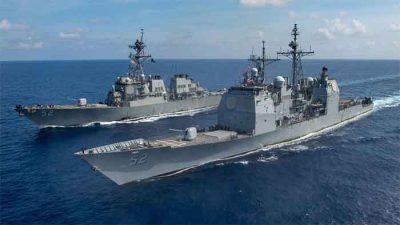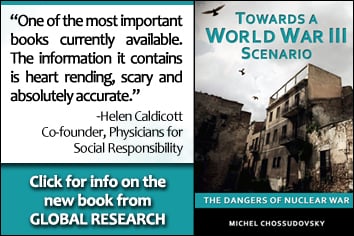AUKUS Submarines: Beasts of Nuclear Proliferation

All Global Research articles can be read in 51 languages by activating the “Translate Website” drop down menu on the top banner of our home page (Desktop version).
To receive Global Research’s Daily Newsletter (selected articles), click here.
Follow us on Instagram and Twitter and subscribe to our Telegram Channel. Feel free to repost and share widely Global Research articles.
***
When faced with the option of acquiring nuclear technology, states have rarely refused. Since the splitting of the atom and the deployment of atomic weapons in war, the acquisition of a nuclear capacity has been a dream. Those who did acquire it, in turn, tried to restrict others from joining what has become, over the years, an exclusive club guarded by self-justified psychosis.
Members of the nuclear club engage in an elaborate ceremonial in claiming that their nuclear weapons inventory will eventually be emptied. Non-nuclear weapons states allied to such powers go along with appearances, taking comfort that nuclear weapons states will offer them an umbrella of security.
This insane hypocrisy underlines such arrangements as the Treaty on the Non-Proliferation of Nuclear Weapons. Central to the document is the discouragement of non-nuclear weapons states from weaponizing nuclear technology as long as members of the nuclear club pursue “good-faith” disarmament negotiations. While it is true to say that the NPT probably prevented a speedier, less infectious spread of the nuclear virus, it remains a constipated regime of imperfections that has merely delayed proliferation.
Most tellingly of all, most non-nuclear weapon states have complied with their undertakings. Nuclear weapons states have not, disregarding serious multilateral nuclear disarmament. Nor do they have an incentive to alter current arrangements, given that any changes to the NPT can only take place with the unanimous support of the three treaty depositories: Russia, the United Kingdom and the United States.
The NPT supporters pour scorn at alternative approaches to nuclear weapons, such as the Treaty on the Prohibition of Nuclear Weapons (TPNW), which had its first meeting of state parties in Vienna from June 21 to 23. While the Albanese government did send Susan Templeman MP to the meeting as an observer, Canberra has remained consistently opposed to the TPNW as a threat to the accepted disarmament and NPT framework. Dated and spurious concepts such as extended nuclear deterrence and the interoperability of Australian and US military systems tend to be common justifications.
The AUKUS security partnership that was announced in September 2021 by Australia, the United States and the United Kingdom, has muddied the pool of non-proliferation. A central component of the agreement is a promise to share nuclear propulsion technology with Australia, enabling it to acquire eight nuclear submarines to be supposedly built in Adelaide, South Australia. While much of this is wishful thinking (Australia has no expertise in the field, and will have to rely wholeheartedly on expertise from the other two), the glaring problem in the arrangement is what it does to non-proliferation arrangements.
While the previous Australian Prime Minister Scott Morrison was ignorantly confident that the agreement would comply with Australia’s own non-proliferation commitments, such confidence is misplaced. For one thing, Article III of the NPT exempts naval reactors from nuclear safeguards, which threatens a pillar of the regime, namely, limiting the production and use of highly enriched uranium (HEU) which can be used, in turn, to make nuclear weapons.
Non-proliferation experts have not been enthusiastic with these promised new beasts for the Royal Australian Navy. Daryl G. Kimball, director of the Arms Control Association, notes the salient difference between deepening defence cooperation on the one hand with allies and proliferating “sensitive HEU nuclear propulsion tech in contravention of US and global nonpro principles.”
Hans Kristensen, director of the Nuclear Information Project at the Federation of American Scientists, greeted AUKUS with much gloom when it was announced. Its provisions on nuclear technology would “further intensify the arms race in the region and the dynamics that fuel military competition.”
The International Atomic Energy Agency’s Director General Rafael Mariano Grossi is visiting Australia to discuss the issue of safeguards regarding nuclear material used for naval propulsion. This is nothing short of problematic, given that IAEA inspectors are unable to inspect such material for extended periods of time when the vessel is at sea.
Grossi, in mild understatement, calls this “quite complex”, though is keen to accommodate Australian commitments to non-proliferation alongside the acquisition of nuclear technology. “There is a period of 18 months which was given by the three partners – the United States, United Kingdom and Australia – to define how the project is going to be implemented but, already we have started this interaction, this joint work of technical levels so that we can reconcile both things.”
In a statement made prior to Grossi’s visit, Foreign Minister Penny Wong reiterated Australia’s “longstanding” support of the “IAEA’s mission to harness the peaceful use of nuclear technology in areas like medicine, industrial processes and environmental monitoring, as well as upholding the international nuclear non-proliferation regime.”
This world as described by Senator Wong is distinctly pre-AUKUS. Despite promises of “open and transparent engagement with the IAEA on nuclear safeguards”, the whinnying horse of proliferation has bolted from the stable. Assurances to avoid the future development of an Australian nuclear weapons capability or a national nuclear fuel cycle also ring hollow.
The precedent of permitting Australia to be the only non-nuclear weapons state with HEU-propelled technology is also seismic on another level. There will be nothing stopping China and Russia doing what the United States and the UK promise to do: proliferate naval reactor technology and long-range missiles with a nuclear capability.
*
Note to readers: Please click the share buttons above or below. Follow us on Instagram and Twitter and subscribe to our Telegram Channel. Feel free to repost and share widely Global Research articles.
Dr. Binoy Kampmark was a Commonwealth Scholar at Selwyn College, Cambridge. He currently lectures at RMIT University. He is a regular contributor to Global Research and Asia-Pacific Research. Email: [email protected]
Featured image is from Wikimedia Commons
 “Towards a World War III Scenario: The Dangers of Nuclear War”
“Towards a World War III Scenario: The Dangers of Nuclear War”
by Michel Chossudovsky
Available to order from Global Research!
ISBN Number: 978-0-9737147-5-3
Year: 2012
Pages: 102
PDF Edition: $6.50 (sent directly to your email account!)
Michel Chossudovsky is Professor of Economics at the University of Ottawa and Director of the Centre for Research on Globalization (CRG), which hosts the critically acclaimed website www.globalresearch.ca . He is a contributor to the Encyclopedia Britannica. His writings have been translated into more than 20 languages.
Reviews
“This book is a ‘must’ resource – a richly documented and systematic diagnosis of the supremely pathological geo-strategic planning of US wars since ‘9-11’ against non-nuclear countries to seize their oil fields and resources under cover of ‘freedom and democracy’.”
–John McMurtry, Professor of Philosophy, Guelph University
“In a world where engineered, pre-emptive, or more fashionably “humanitarian” wars of aggression have become the norm, this challenging book may be our final wake-up call.”
-Denis Halliday, Former Assistant Secretary General of the United Nations
Michel Chossudovsky exposes the insanity of our privatized war machine. Iran is being targeted with nuclear weapons as part of a war agenda built on distortions and lies for the purpose of private profit. The real aims are oil, financial hegemony and global control. The price could be nuclear holocaust. When weapons become the hottest export of the world’s only superpower, and diplomats work as salesmen for the defense industry, the whole world is recklessly endangered. If we must have a military, it belongs entirely in the public sector. No one should profit from mass death and destruction.
–Ellen Brown, author of ‘Web of Debt’ and president of the Public Banking Institute

